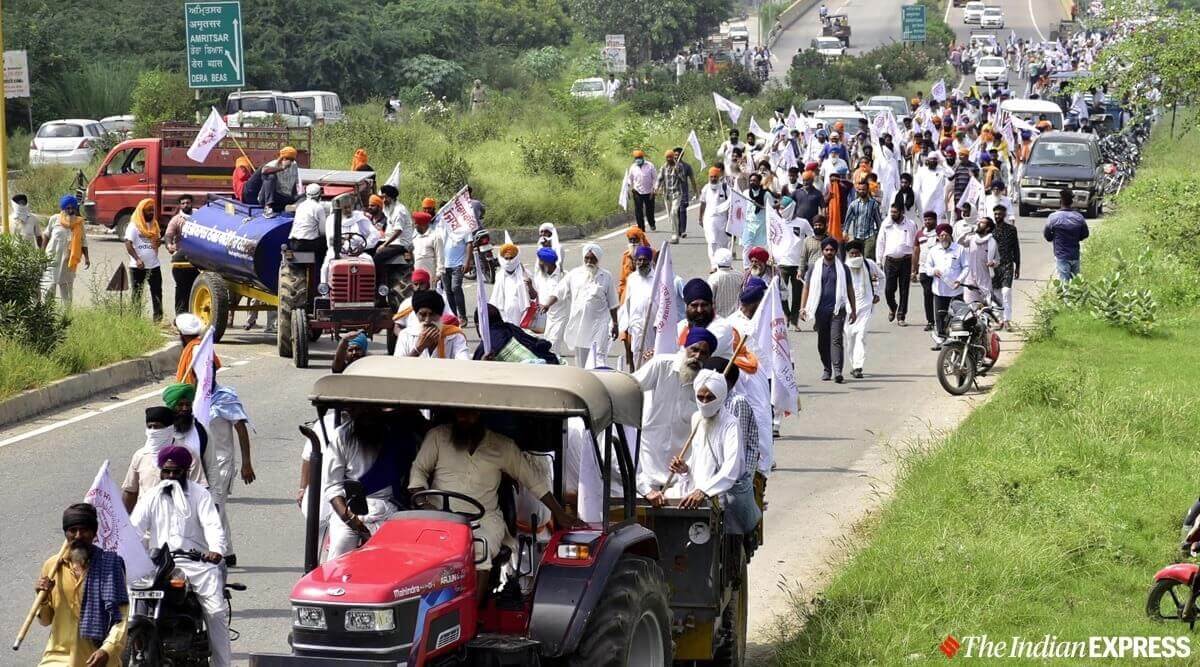Farmers across the Indian states of Haryana, Punjab, and Uttar Pradesh are participating in a nationwide protest and strike today against farm bills cleared by the Rajya Sabha last week. The Upper House passed the bills amidst fierce agitation and pandemonium in the parliament that opposition leaders have called a “murder of democracy”.
On Monday, as the Upper House passed the controversial agricultural bills, eight opposition parliamentarians were suspended for “unruly behaviour”. While the chaotic protests on Sunday were due to the fact that the deputy chairman of the house refused to hold a physical vote on the controversial bills, the chaos that ensued prompted the House speaker to move a motion for their suspension. As a result, many opposition leaders decided to boycott the rest of the session. Vice President and Rajya Sabha chairman Venkaiah Naidu said that, while the opposition had the right to protest, the leaders were suspended due to the nature in which they chose to protest.
The agricultural reform bills in question—The Farmers’ Produce Trade And Commerce (Promotion And Facilitation) Bill, The Farmers (Empowerment and Protection) Agreement on Price Assurance and Farm Services Bill, and The Essential Commodities (Amendment) Bill—have been criticized for being too liberalized and for assuming that the current structure is devoid of private entities. Farmers fear that changes to the crucial minimum support price clause, doubled with the ease of business for corporate entities, will complicate their lives as they already struggle to sell goods. Further, the laws have been slammed for being opaque and providing no redressal mechanisms or sureties to farmers, with the government essentially stepping back from its role as a guarantor in a free market system. Last week, Harsimrat Kaur Badal, Union Cabinet Minister of Food Processing Industries and MP of the Shiromani Akali Dal, a long-time ally of the BJP, also resigned from her cabinet position to protest against the bills.
On Friday, Prime Minister Narendra Modi hit out at the protesting opposition, accusing parties of “lying” to farmers. Addressing his party workers at a commemorative event for Deen Dayal Upadhyaya’s birth anniversary, Modi said that the opposition was using farmers for political benefit, and that there is a need for BJP workers to reach out and sensitize farmers on the reforms in simplified language. “Previous governments used to make a complicated web of promises and laws which farmers or labourers could never understand. But BJP-led NDA government has constantly tried to change this situation and has introduced reforms for the welfare of farmers,” he said, adding, “Our ground connect will bust the propaganda being spread in the virtual world.”
After the boycott, the ruling party passed fifteen bills over two days in the absence of the opposition, including three extremely contentious labour laws opposed by several labour unions, including one linked to the Rashtriya Swayamsevak Sangh (RSS), the ideological partner of the ruling Bharatiya Janata Party (BJP). The new labour codes subsume some 25 existing laws on social security, occupational safety, and industrial relations, paving way for corporate entities to have more ease and flexibility in doing business, firing and hiring, and penalising industrial strikes while promoting the reduced influence of trade unions, fixed-term employment, and expanding the social security net provided to informal workers. The labour reforms have also been heavily criticized for allowing states a free hand to exempt laws that protect crucial labour rights.
The Rajya Sabha also ended its monsoon session eight days ahead of schedule as 83 of the Secretariat’s 1,500-odd employees tested positive for the coronavirus.
Rajya Sabha Ends Session 8 Days Early Due to COVID-19, Farmers Strike over New Bills
Opposition leaders had boycotted parliamentary proceedings over the suspension of their party members and the lack of debate surrounding the proposed reforms.
September 25, 2020

SOURCE: THE INDIAN EXPRESS
